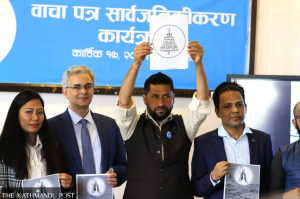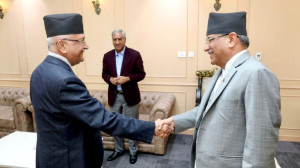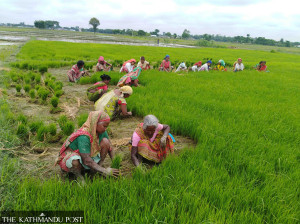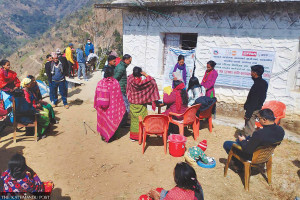 19.12°C Kathmandu
19.12°C KathmanduColumns
Anguish over senseless wars
Can literary writers turn the anguish caused by senseless wars into strength?
Abhi Subedi
I joined a group of Nepali writers, mostly poets, to attend the 64th SAARC literary festival held in New Delhi from December 3-6, 2023. The theme of the conference, “anguish and senseless wars”, attracted me. Anguish is a theme that the writers have been writing about. This Anguish, Like a Kind of Intimate Song is the title of a book written by L Leigh Westerfield. Anguish is related to the ''resistance in women's literature of World War II" in that book. A 90-year-old Punjabi fiction writer, Ajeet Cour, felt this “anguish” to be the “intimate song”, in this case. She wanted to share this anguish with writers of this region.
The story that I am going to write is visceral because I have been associated with this literary organisation, also known as the Foundation of SAARC Writers and Literature (FOSWAL), for over 22 years. I am familiar with the genesis of this organisation, which was started by Cour, who has been working through the political vicissitudes of this region.
Cour, who sometimes looked like a fugitive to me, embodies a history of literary writing and organisations in this region. She found the SAARC countries’ organisation that has its headquarters in Thamel of Kathmandu, almost as a heuristic pattern that she could perhaps emulate to architect this organisation. I have witnessed her over difficult times, taking up the cudgel to build a regional organisation of writers and galvanise them under this structure. For instance, I saw her making it possible for Pakistani writers to come to Delhi—they came in hordes in some years.
I reminisce about one event. I joined Cour and her SAARC writers’ team when she organised this organisation’s meeting in Lahore in March 2004, where I had intimate conversations with an Indian fiction writer named Kamaleshwar (1932-2007). His novel Kitne Pakistan (How Many Pakistans?) struck me as the allegory of the turbulent times of our region as well as those going through similar conditions. I had known Kamaleshwar before. I find this Hindi novel published in 2000 as the prophetic story of the 21st century though we have traversed only two decades of its history—its tumultuous times.
The anguish felt by the nonagenarian Didi about wars, especially the Ukraine-Russia and Israel-Gaza wars, truly reflects literary writers’ concern. Non-partisan humanists, creators and advocates of peace and welfare, the writers get hurt more than others by the colossal loss of lives, including children, in these and all other senseless wars. Truly senseless wars touch all artists. There are many instances of writers’ opposition to the wars. But they have paid heavily for such gestures. There is a history of banning books written against wars and other atrocities. In several places today, the voices of writers are drowned; they are even persecuted. As a result, fewer writers are speaking today.
Organising writers in one place has become a rare and difficult activity. We have instances, however, of literary writers, artists and musicians bonding to oppose wars. Cour’s choice of “anguish” and “senseless wars” lexicons is very significant. She is particularly anguished over the ongoing two wars. The greatest casualties in the wars are the children and women. The terrorist attacks and the state responses are binaries. Cour’s call is not political; it is prompted by the “anguish” caused by the terrible loss of lives, the unimaginable sufferings of people who are dying, losing homes and natural lives, and being kidnapped and killed. I had never seen such a human disaster before. Pictures of war are inundating us every day. In her opening address, Ajeet Cour said, “We share our pains and anguish”.
I was asked to speak at the opening with three other writers from India on the theme of “anguish and senseless wars”, and to talk about Buddhism in the same session. Again, my presentation was visceral. I spoke about Buddhism as a source of creative energy among writers, thinkers and artists in Nepal and elsewhere. I mentioned my exercise in this regard by writing several plays evoking Buddhism.
The participation of Nepali writers and poets at the conference was remarkable. The good responses they received from the audience once again convinced me about the quality of their poetry writing. They recited their poems; some chaired the poetry sessions, and others made presentations at different sessions. Nepal’s ambassador to India, Shankar Sharma, the sole representative of the SAARC countries there, also spoke at the inauguration. It was a great opportunity to meet and interact with writers from India, Bangladesh, Sri Lanka and Bhutan.
I must mention a very important context here. Arpana Cour, the eminent painter who is assisting these conferences, has written a significant article, “Contemporising Buddha”, in one book of FOSWAL. She writes, “Buddha said that he was not keen to reach personal Nirvana as long as there was a single suffering creature of Earth. This led me to paint several works called compassion in which the Buddha sheds pure tears for humanity”.
She made a mural of a Gandhara Buddha on tiles, on the outer wall of the SAARC Secretariat central office in 2009. This painting meets my eyes whenever I visit a coffee house nearby. In my article written in The Kathmandu Post (“The SAARC Buddha”, August 18, 2019), I have concluded, “The artist’s imaginaire embodied in the SAARC Buddha in Thamel says, writers, artists and creators should evoke the great traditions of bonding at different times and spaces in South Asia, explore ways to meet and remember, and not let governments rip them asunder”.
Watching the Gandhara Buddha from the coffee house in Thamel yesterday, I contemplated the human condition, the anguish and the senseless wars and asked: Do literary writers have the strength to turn the anguish caused by senseless wars into strength? Poet Bhisma Upreti’s poem recited at the conference reverberated in my ears: “Yes, writers can turn the anguish into the strength of a creative order”.
The resolve of 90-year-old Ajeet Cour, who created a unique forum of creative writers and thinkers in beleaguered times, says writers, poets and painters should take up the cudgel to overcome the anguish by opposing all forms of senseless wars. An unflinching determination and respect for human dignity and freedom is the mantra to achieve that.



















